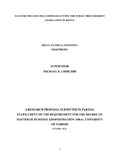| dc.description.abstract | Worldwide, public procurement has become an issue of public attention and debate, and has been subjected to reforms, restructuring, rules and regulations. Public procurement refers to the acquisition of goods, services and works by a procuring entity using public funds. This study sought to evaluate the factors influencing compliance with the public procurement legislation in Kenya. To achieve this objective, the study employed a cross sectional descriptive survey. Data was collected using a semi-structured questionnaire from government ministries and departments. A total of 36 questionnaires were administered to various government ministries and departments but the researcher managed to obtain 31 completed questionnaires representing a response rate of 86.1% .The researcher adopted a drop-and –pick-later approach where questionnaires were issued in the morning and picked in the evening to allow the respondents to complete the questionnaires.
The collected data was edited, coded and entered for analysis using the Statistical Package for Social Sciences (Version 17.0) computer package. Both descriptive and inferential statistics were used. Eight factors were considered. Factor analysis sorted the eight factors into three main factor components according to their absolute values. The higher the absolute value of the loading, the more the factor contributes to the variable. Component1 contains four factors while components two and three contain two factors each. Component 1 comprises awareness in provision of public procurement, top management support, staff training and institutional factors. Component two comprises of internal processes and ICT. Component three on the other hand comprises of accountability and procurement ethics. The variables in component 1 had more explanatory power in explaining compliance with public procurement legislation in Kenya than those in component 2 and 3. The findings of this study will be of great use to the government, lending institutions in formulating procurement policies so as to promote compliance in the public sector. | en |

